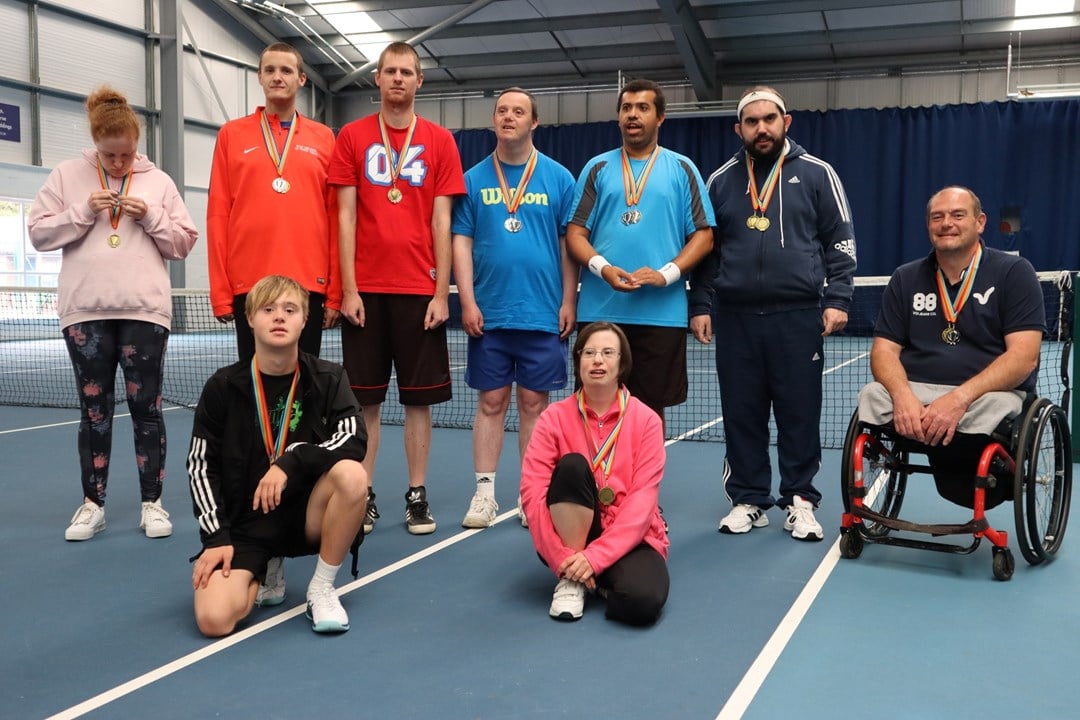
“It’s just so normal for us all to play together” – Tennis coach Paul Singleton discusses the inclusive community behind Grantham Tennis Club
• 3 MINUTE READ
If you stopped and asked the question, ‘have you ever felt excluded?’ to random passers-by on the street, we can be sure that most of the responses you’d receive would be yes. In fact, if you were to ask the question, ‘have you ever passed judgement on someone, yourself?’ again, the majority would regrettably admit they have. However, tennis coach Paul Singleton makes it his priority day in, day out to avoid just that; to ensure that no one feels excluded, no one feels judged, rather everyone is welcomed, included, and encouraged to play tennis while having fun doing so.
Paul Singleton is amongst the proud coaches at Grantham Tennis Club to teach all aspects of the Open Court Programme (OCP). From holding performance lessons and teaching non-disabled players to coaching wheelchair tennis and learning disability sessions; he’s done it all. Yet, his love affair with the sport went unnoticed for many years until a life-changing diagnosis turned his world upside-down.

“I came into tennis later in life as I used to play and coach football and cricket growing up,” said Singleton. “However, I got a rare flesh-eating disease called Necrotising fasciitis, and I was in a coma for six weeks. I was pretty much dead for quite some time and eventually had both legs amputated. After about a year of learning to swallow – you know, exciting things like that - somebody just approached me and said I should give tennis a go. Two weeks later, I started Grantham Tennis Club’s wheelchair programme.”
Swiftly taking to the game, it wasn’t long before Singleton decided to dial back into his coaching roots after bringing his then three-year-old son along to one of his weekly sessions.
“I had two little kids at the time and there weren’t really sessions available for their age groups,” admitted Singleton. “So, I spoke to one of the coaches and asked if my son could come along if I helped out with the lesson, and that’s how it started. From there I just continued to do it and began to support with a lot of the wheelchair lessons and learning disability programmes before eventually going to get my coaching qualifications.”
Since becoming a coach, Singleton has created ceaseless opportunities, becoming the head coach for the Special Olympics in the Midlands and the Great Britain coach for the Special Olympics World Games in Berlin, whilst simultaneously striving for his Level 4 coaching award. And now, as players of all different abilities and backgrounds travel from far and wide to attend his sessions, we asked the question sure to be at the forefront of everyone’s minds: what’s your secret?
Singleton enthused, “I’ll turn up half an hour early to spend some time in the café talking and getting to know everybody. Some of our members have gone out and learnt more about disability tennis so they can make everyone who joins feel at complete ease. People come along for the first time, and they can’t believe how friendly it is, and how integrated everybody is.”
Not only do players socialise and reconnect over refreshments in hand off court, but regardless of ability – whether you attend learning disability, performance, wheelchair, visually impaired, deaf, or non-disabled sessions – everyone is warmly welcomed to take part in all the action on court.

“We have able-bodied players that come to our wheelchair sessions just because they like the people in it,” explained Singleton. “Then we have some of our learning disability players go to cardio tennis with everybody else on a Saturday morning. Nobody ever batts an eyelid. It’s just so normal for us all to play together.
Obviously, the tennis is important, but I always say that for most people it’s more than just tennis.
“The social aspect of Grantham Tennis Club is just fantastic; you get to meet so many people. Obviously, the tennis is important, but I always say that for most people it’s more than just tennis.”
READ more about our new open for all plan
Read our updated LTA Disability Plan to gain insight into our new objectives surrounding opening tennis up to more disabled people across Britain.





